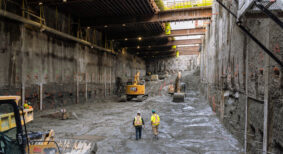The Government of British Columbia has released its CleanBC, developed as a pathway to achieve the province’s legislated climate targets of reducing greenhouse gas (GHG) emissions by 40 per cent by the year 2030, based on 2007 levels. The plan describes and quantifies measures that will eliminate 18.9 megatonnes (Mt) of its 2030 target. Remaining reduction initiatives will be quantified over the next 18 to 24 months.
Highlights of the CleanBC plan include:
- By 2040, every new car sold in B.C. will be a zero-emission vehicle. Government is helping people afford cleaner cars and save money on fuel with incentive programs, and making it easier to charge or fuel them: 1.3 Mt of carbon pollution reduced by 2030
- The Province is speeding up the switch to cleaner fuels at the gas pump – with further reductions to the carbon intensity of transportation fuels: 4.0 Mt of carbon pollution reduced by 2030
- Every new building constructed in B.C. will be “net-zero energy ready” by 2032. Along the way, government is requiring new buildings to be more efficient, and ramping up funding for renovations and energy retrofits to existing homes and offices, including $400 million to support retrofits and upgrades for B.C.’s stock of publicly funded housing: 2.0 Mt of carbon pollution reduced by 2030
- Government is helping B.C. to reduce residential and industrial organic waste, turning it into a clean resource: 0.7 Mt of carbon pollution reduced by 2030
- The Province is helping industry lower its emissions and reduce its pollution: 8.4 Mt of carbon pollution reduced by 2030
Through the BC Energy Step Code, the province is the first in Canada to define a clear path for all new buildings to be net-zero energy ready (ultra energy efficient) by 2032.
The CleanBC climate plan includes new deadlines and requirements for boosting energy efficiency in new construction. As of 2022 builders will need to meet the performance requirements of Step 3, Part 9 and Step 2, Part 3 of the BC Energy Step Code. Five years after that, the requirements will increase again, as the province moves another “step” up the energy efficiency staircase on the way to net-zero energy-ready new buildings in 2032.
Between 2022 and 2025, new energy efficiency standards will be set for space heaters, water heaters and residential windows. These will build on improvements introduced in 2018, which set new standards for lighting, air source heat pumps and gas fireplaces.
Starting in the coming year, the province will also offer new incentives for builders, developers and manufacturers to stimulate the development and demonstration of innovative, low-carbon building solutions.
The Low Carbon Buildings Innovation Program will accelerate the availability, acceptance and affordability of high performance solutions such as advanced building designs, advanced construction methods and ultra-efficient building components.









